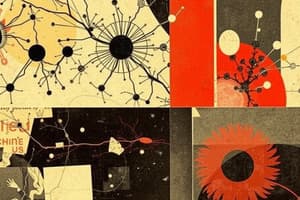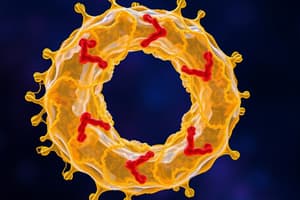Podcast
Questions and Answers
Which phase of the cell cycle involves the synthesis of DNA?
Which phase of the cell cycle involves the synthesis of DNA?
- M phase
- G1 phase
- G2 phase
- S phase (correct)
What is the resting phase postmitotic quiescent in the cell cycle called?
What is the resting phase postmitotic quiescent in the cell cycle called?
- G2 phase
- S phase
- G1 phase
- G0 phase (correct)
Which phase of the cell cycle involves cell growth in preparation for cell division?
Which phase of the cell cycle involves cell growth in preparation for cell division?
- M phase
- G2 phase (correct)
- S phase
- G1 phase
What are the checkpoints in the cell cycle?
What are the checkpoints in the cell cycle?
Which cell cycle phase is known as the first gap phase?
Which cell cycle phase is known as the first gap phase?
What is the main focus of the cell cycle phase G2?
What is the main focus of the cell cycle phase G2?
How does RB stop the cell cycle?
How does RB stop the cell cycle?
Which of the following promotes cell cycle progression by activating CDK-1?
Which of the following promotes cell cycle progression by activating CDK-1?
How do p53 stop the cell cycle?
How do p53 stop the cell cycle?
How do p21 and p27 affect the cell cycle?
How do p21 and p27 affect the cell cycle?
What is the function of G1 phase in the cell cycle?
What is the function of G1 phase in the cell cycle?
Which phase involves enzyme, protein, and ATP synthesis?
Which phase involves enzyme, protein, and ATP synthesis?
What is the main function of the G0 phase in the cell cycle?
What is the main function of the G0 phase in the cell cycle?
Which phase is the rate-limiting step for most cells?
Which phase is the rate-limiting step for most cells?
What are cyclin-dependent kinases (Cdks) responsible for in the cell cycle control system?
What are cyclin-dependent kinases (Cdks) responsible for in the cell cycle control system?
What is the role of the M-Cdk complex in mitosis?
What is the role of the M-Cdk complex in mitosis?
How is the Metaphase-to-Anaphase (M-to-A) checkpoint regulated?
How is the Metaphase-to-Anaphase (M-to-A) checkpoint regulated?
Which proteins primarily govern the activities of G1/S and S-Cdks early in the cell cycle?
Which proteins primarily govern the activities of G1/S and S-Cdks early in the cell cycle?
What is the role of tumor suppressor gene p53 in cell cycle regulation?
What is the role of tumor suppressor gene p53 in cell cycle regulation?
How can extracellular signaling affect the cell cycle?
How can extracellular signaling affect the cell cycle?
Which cyclin forms a complex with Cdk2 at the end of G1 and helps trigger progression through the start transition?
Which cyclin forms a complex with Cdk2 at the end of G1 and helps trigger progression through the start transition?
Which cyclin is involved in stimulating chromosome duplication during S phase and contributes to the control of some early mitotic events?
Which cyclin is involved in stimulating chromosome duplication during S phase and contributes to the control of some early mitotic events?
Which cyclin forms a complex with Cdk1 to stimulate entry into mitosis at the G2/M transition?
Which cyclin forms a complex with Cdk1 to stimulate entry into mitosis at the G2/M transition?
Which cyclin-cdk complex is needed for progression through the start transition?
Which cyclin-cdk complex is needed for progression through the start transition?
What happens to cyclin D and cyclin E in early S phase?
What happens to cyclin D and cyclin E in early S phase?
Which cyclin forms a complex with Cdk2 at the end of G1 and helps trigger progression through the start transition?
Which cyclin forms a complex with Cdk2 at the end of G1 and helps trigger progression through the start transition?
Which cyclin is involved in stimulating chromosome duplication during S phase and contributes to the control of some early mitotic events?
Which cyclin is involved in stimulating chromosome duplication during S phase and contributes to the control of some early mitotic events?
Which cyclin forms a complex with Cdk1 to stimulate entry into mitosis at the G2/M transition?
Which cyclin forms a complex with Cdk1 to stimulate entry into mitosis at the G2/M transition?
Which cyclin-cdk complex is needed for progression through the start transition?
Which cyclin-cdk complex is needed for progression through the start transition?
What happens to cyclin D and cyclin E in early S phase?
What happens to cyclin D and cyclin E in early S phase?
Growth factors are required for this phase of the cell cycle: _______
Growth factors are required for this phase of the cell cycle: _______
Which CKI will prevent RB inactivation?
Which CKI will prevent RB inactivation?
Akt can activate......
Akt can activate......
Akt deactivates......
Akt deactivates......
Flashcards are hidden until you start studying
Study Notes
Cell Cycle Regulation in Mitosis
- The M-Cdk complex is inhibited via phosphorylation by Wee1 and de-phosphorylated by Cdc25 to initiate mitosis.
- The M-Cdk complex is essential for the activation of proteins required for mitosis, which progresses through prophase, pro-metaphase, and metaphase.
- The Metaphase-to-Anaphase (M-to-A) checkpoint is regulated by the APC/C complex, which targets securin for destruction to allow sister chromatid separation.
- After anaphase, the M-cyclins are targeted for destruction, leading to dephosphorylation of Cdk targets required for the completion of mitosis.
- Unfavorable conditions can pause the cell cycle at key checkpoints, such as G1, S, and the M-to-A checkpoint.
- The cell cycle progression can be regulated by Cdk inhibitory proteins (CKIs) and tumor suppressor genes, such as p16, p21, p27, p53, and RB.
- CKIs primarily govern the activities of G1/S and S-Cdks early in the cell cycle, inhibiting cyclin-Cdk complexes.
- Tumor suppressor genes p53 and RB play crucial roles in recognizing damaged DNA and promoting cell cycle arrest.
- Contact inhibition, regulated by cadherins and the Beta-catenin pathway, can also inhibit cell cycle progression by preventing cell division when in contact with other cells or matrix components.
- Extracellular signaling can either promote cell proliferation or inhibit the cell cycle through survival pathways.
- The regulation of the cell cycle involves complex molecular mechanisms, including the activation and inhibition of cyclin-Cdk complexes and the recognition of DNA damage.
- Understanding the molecular basis of cell cycle regulation is crucial for comprehending the complex mechanisms that govern cell division and proliferation.
Cyclin-Cdk Complexes in Cell Cycle Regulation
- There are 4 classes of cyclins that form specific complexes with Cdks: G1/S-cyclins, S-cyclins, M-cyclins, and G1-cyclins.
- Cyclin-Cdk complexes play a crucial role in cell cycle regulation by triggering progression through different checkpoints such as the G1/S checkpoint and the G2/M checkpoint.
- Cyclin E forms a complex with Cdk2 at the end of G1 and helps trigger progression through the start transition, while Cyclin A forms a complex with Cdk1 and Cdk2 to stimulate chromosome duplication during S phase.
- The accessibility of Cdk substrates changes during the cell cycle, leading to different effects induced by cyclin-Cdk complexes at different times.
- The anaphase promoting complex (APC/C) is needed for the progression through the Metaphase-to-anaphase checkpoint and stimulates the proteolytic destruction of specific regulatory proteins.
- Growth factors are required in the G1 phase to stimulate cellular growth and proliferation, leading to the transcription and translation of Cyclin D and Cyclin E.
- The G1-cdk complex, formed by Cyclin D and Cdk4/Cdk6, and the G1/S-cdk complex, formed by Cyclin E and Cdk2, allow progression through the start checkpoint by targeting the protein RB and phosphorylating it.
- Hyperphosphorylation of RB inactivates it, releasing a transcription factor E2F and allowing transcription to proceed, including the transcription of cyclin E and cyclin A.
- Cyclin D and Cyclin E are targeted for destruction by a protein called SCF in early S phase, promoting progression through the S phase of the cell cycle.
- The S-cdk complex allows progression through the S phase, while the M-cyclin levels begin to rise in G2 phase, forming the M-Cdk complex needed to pass through the G2/M checkpoint.
- The M-Cdk complex is controlled to ensure that mitosis doesn’t start too soon, with the M-cyclins transcribed at specific times and targeted for proteolysis by APC/C at the end of G2.
- Cyclin-Cdk complexes function by activating the Cdk, directing it to a specific target protein, and inducing different effects at different times in the cell cycle due to changes in substrate accessibility.
Studying That Suits You
Use AI to generate personalized quizzes and flashcards to suit your learning preferences.




